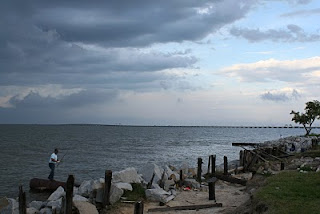Looking over slabs of cracked concrete and sodden parking lots as is often the way during these interminable afternoons at work, I am struck by how the world has changed and the days of adventure are as dead as the cold remnants of my coffee cast into the trash hours earlier.
To be fair I have never planned an expedition across the wastes of the Kalahari desert or returned half frozen from an obscure ledge in the Himalayas. I have never even been forced to eat my dog which I'm told is the act that separates the men from the explorers.
I have never set out across the Pacific on a rudimentary raft like Thor Heyerdahl and his crew on the Kon-Tiki expedition or charted an unknown waterway like John Wesley Powell who stumbled on the Grand Canyon, which is no small thing to tell your kids.
And had I organized an expedition where would I have gone? There are no unchartered places; there are few empty spaces on the map. There is no wilderness big enough for a modern day Lewis and Clark to find.
Nor is there enough space on this constricted and much charted planet for those heroes who I had half forgotten about such as TE Lawrence, whose exploits as Lawrence of Arabia brought some of the romance back to a public mired in horror at the bloodshed of the Western Front.
Lawrence was a classic 'boy's own hero' beloved of a generation growing up in Britain in the early 20th century.
The Empire and the glorious days when half of the planet was pink, spawned many heroes in its day. Only with the benefit of hindsight has it become clear that Empire that the sun never set on was as corrupt and unforgiving as anything the French or Germans could ever impose.
These heroes lived courageously and died in the call of duty. Tennyson wrote of Gordon of Khartum who was killed in the Sudan. "Warrior of God, man's friend, not here below/ But somewhere dead far in the waste Sudan/ Thou livest in all hearts, for all men know/ This earth hath borne no simpler, nobler man."
But to me Horatio Nelson was nobler still and is England's greatest hero. The diminutive admiral had all the elements of a storybook hero; a humble background, a reputation for acts of brazen courage, an affair that scandalized polite society and a hero's death at Trafalgar in the midst of his greatest triumph.
Today there are no heroes and warfare is a mechanised mismatch of smart bombs and technological capabilities.
We can see the unforgiving wildernesses and Polar wastes from the comfort of a cruise liner; we can fly above the deserts and jungles where explorers died of dystentry or from the wounds inflicted by poison darts.
And we are surely the poorer for it.
In my adolescence I charted the course of suburban rivers and fought the willows upstream. I was entranced by the small time forbidden wildernesses of the overgown railway line and the chance of sudden death in the form of an express train.
And in my late teens I spent nights in terraced homes meticulously plotting long distance hikes that we made along the cliffs of the Pembrokeshire Coast Path, the South West Way and the West Highland Way.
Waking up in a tent on the lonely and lovely north shores of Loch Lomond was hardly the stuff of Captain Scott. When one of my friends announced he was going outside and would be gone some time he was usually clutching a roll of toilet paper.
But waking up to a new mountain and clouds drifting across Rannoch Moor was a mini adventure.
For so many years now I have been closed off from these big horizons. The urge to explore had been curtailed by the leaden wheels of prams or the call of duty.
Yet lately something has stirred in me like the half memory of the road less trodden that leads through an olive grove and gives tantalizing views of the shimmering Aegean beyond.
The feeling makes me turn to Tennyson again to re-read Ulysses and to think of far off places and adventures on the ringing plains of windy Troy.
But the only thing ringing tonight was my trolly at Wal-Mart. The one with the squeaking wheels that runs to me like a lost puppy dog every time I'm there.








